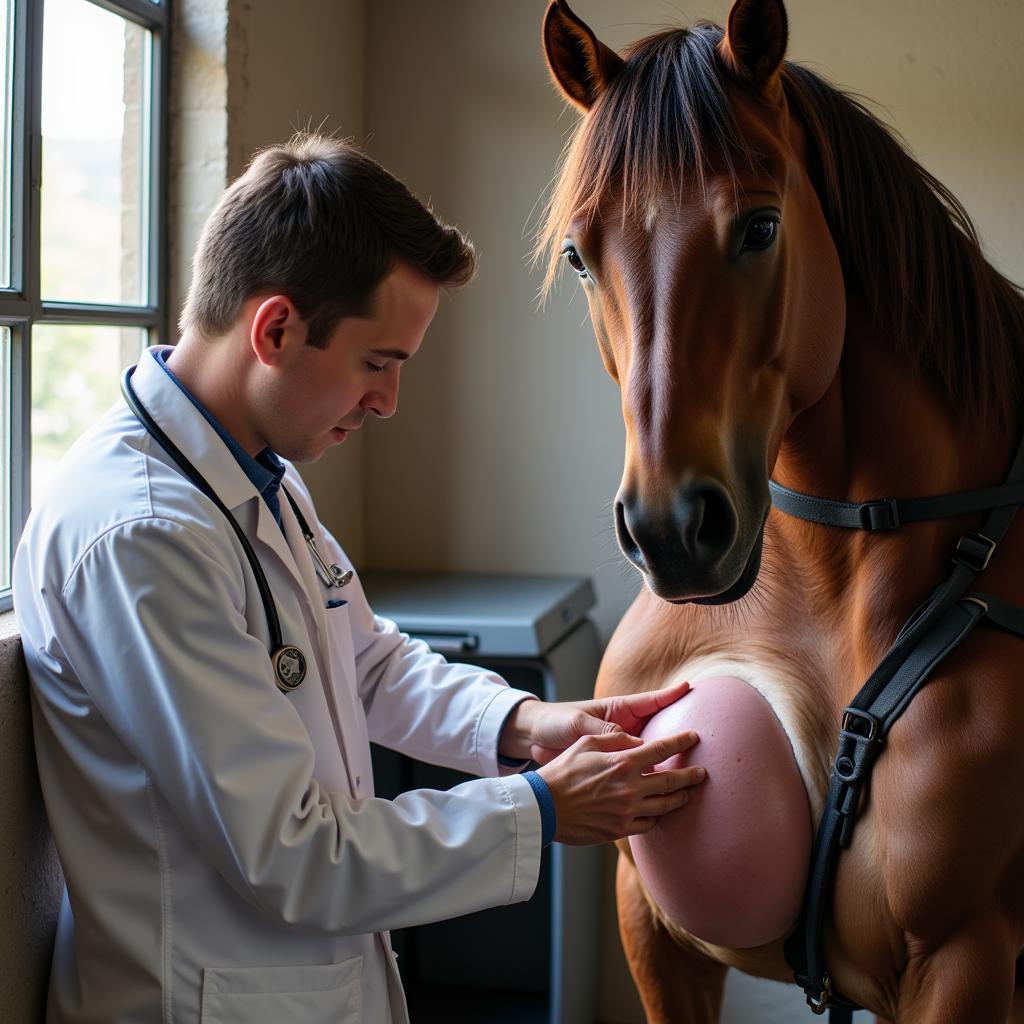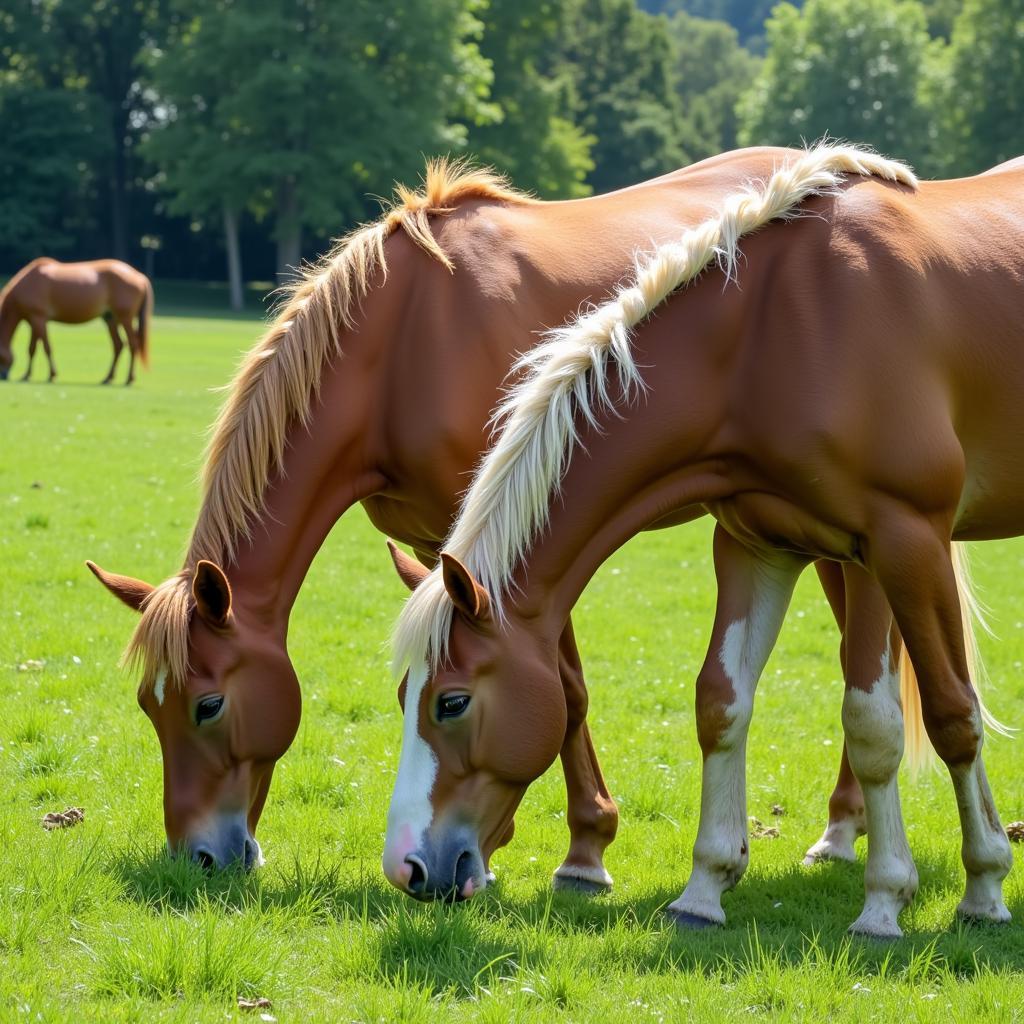A Bloated Horse can be a worrying sight for any owner. This condition, often appearing as a distended abdomen, can range from mild gas to a serious medical emergency. Understanding the causes, symptoms, and treatment of a bloated horse is crucial for ensuring your equine companion’s well-being.
Recognizing a Bloated Horse: Is it Just Gas or Something More?
Bloat in horses, technically known as abdominal distension, can be caused by a variety of factors, from simple overeating to life-threatening conditions. Recognizing the signs early is key to effective treatment. Is your horse experiencing mild discomfort or showing signs of severe pain? A horse bloated stomach can indicate various underlying issues. Let’s delve deeper into what causes this condition.
Common Causes of Bloat in Horses
Several factors can contribute to a bloated horse. These include:
- Gas colic: This is the most common cause of bloat. It occurs when gas builds up in the horse’s digestive system, causing discomfort and distension.
- Impaction colic: This type of colic occurs when a blockage forms in the intestines, preventing the passage of food and gas. This can lead to a distended abdomen.
- Overeating: Consuming large amounts of grain or lush pasture can lead to excessive gas production and bloat.
- Intestinal displacement or torsion: These are serious conditions where the intestines twist or become displaced, requiring immediate veterinary attention.
- Parasites: A heavy parasite burden can disrupt the normal function of the digestive system, potentially leading to bloat.
Symptoms of a Bloated Horse: What to Look For
A horse bloated stomach can be accompanied by various other symptoms:
- Visible swelling of the abdomen: The horse’s belly may appear larger than usual, particularly on the left side.
- Restlessness and pawing: The horse may show signs of discomfort and unease.
- Rolling: Attempting to roll can be a sign of severe abdominal pain.
- Loss of appetite: A bloated horse may be reluctant to eat.
- Sweating: Profuse sweating can indicate pain and stress.
- Increased heart rate and respiration: These are signs of distress and should be taken seriously.
 Bloated Horse Symptoms
Bloated Horse Symptoms
Treating a Bloated Horse: From First Aid to Veterinary Care
If you suspect your horse is bloated, immediate action is essential. First aid measures can help alleviate discomfort while waiting for the veterinarian.
- Remove food and water: This prevents further gas production.
- Gentle walking: Encourage the horse to walk to stimulate gut motility.
- Do not administer any medications without veterinary guidance.
Contact your veterinarian immediately for a proper diagnosis and treatment plan. Treatment will depend on the underlying cause of the bloat and may involve:
- Nasogastric intubation: This procedure involves passing a tube through the horse’s nose and into the stomach to relieve gas pressure.
- Pain medication: To manage discomfort and pain.
- Fluid therapy: To correct dehydration and electrolyte imbalances.
- Surgery: In severe cases, such as intestinal displacement or torsion, surgery may be necessary.
 Veterinarian Treating Bloated Horse
Veterinarian Treating Bloated Horse
“Early intervention is crucial when dealing with a bloated horse,” says Dr. Emily Carter, DVM, an equine specialist with over 20 years of experience. “Prompt veterinary care can significantly improve the chances of a full recovery.”
Preventing Bloat in Horses: Management Practices for a Healthy Gut
Preventing bloat involves good management practices. Here are some key strategies:
- Regular deworming: Control parasite burdens.
- Gradual dietary changes: Introduce new feeds slowly to avoid upsetting the digestive system.
- Avoid overfeeding: Provide smaller, more frequent meals.
- Ensure access to fresh, clean water: Proper hydration is essential for digestive health.
- Dental care: Regular dental checkups can prevent dental problems that may contribute to digestive issues.
Conclusion: Keeping Your Horse Healthy and Happy
Bloat in horses can range from a minor inconvenience to a life-threatening emergency. Understanding the causes, symptoms, and treatment options is vital for responsible horse ownership. By implementing preventative measures and seeking prompt veterinary care when necessary, you can help keep your equine companion healthy and happy for years to come. Remember, early intervention is key when dealing with a bloated horse.
 Healthy Horse Digestive Care
Healthy Horse Digestive Care
“A healthy digestive system is essential for a horse’s overall well-being,” adds Dr. Carter. “By focusing on preventative care and being vigilant for any signs of digestive upset, owners can play a crucial role in maintaining their horse’s health.”
FAQ
- What is the most common cause of bloat in horses? Gas colic.
- Is bloat in horses always a serious emergency? No, but it should always be checked by a veterinarian.
- Can I treat a bloated horse myself? You should contact your veterinarian immediately for guidance and treatment.
- What should I do if I suspect my horse is bloated? Remove food and water, encourage gentle walking, and contact your vet.
- How can I prevent bloat in my horse? Regular deworming, gradual dietary changes, and avoiding overfeeding are key.
- What are the signs of a bloated horse? Swollen abdomen, restlessness, rolling, loss of appetite, sweating, increased heart rate and respiration.
- Is surgery always required for a bloated horse? No, surgery is only necessary in severe cases, such as intestinal displacement or torsion.
For further information on horse health, you can explore other articles on our website. Consider reading about colic prevention and general equine digestive health.
When you need support, please contact Phone Number: 0772127271, Email: [email protected] Or visit us at: QGM2+WX2, Vị Trung, Vị Thuỷ, Hậu Giang, Việt Nam. We have a 24/7 customer service team.